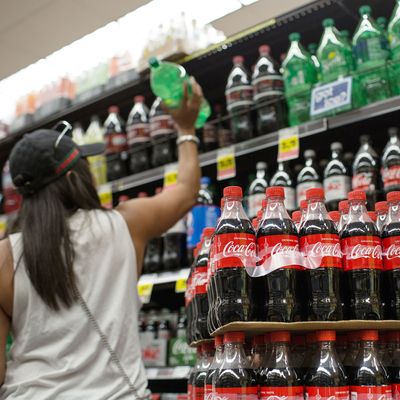
Beverage companies have recently been placed on the defensive by state and local lawmakers seeking sanctions to reduce the impact of sugary soda drinks on public health. And half of the eight cities nationwide that have imposed new taxes (including San Francisco, Oakland, and Berkeley) to reduce consumption and offset the alleged public costs of soda consumption are in California, with four more cities pursuing soda taxes this year.
But instead of slogging it out on a city-by-city basis, with all the bad optics involved in arguing that upticks in diabetes and childhood obesity aren’t all that big a deal, Big Soda chose an audacious and successful strategy for stopping new soda taxes in California. It spent heavily to gain signatures for a proposed ballot initiative that would have imposed a supermajority requirement on all local tax increases in the state, and then backed off when the legislature agreed to pass a bill banning local soda tax measures until 2031.
Under California’s controversial ballot-initiative system, backers of proposed general-election ballot measures can withdraw their handiwork up until June 28. So it’s become standard practice for interests wealthy enough to organize signature campaigns to offer legislators a chance to head them off with friendly legislation. In this case, the deal was basically cut between the beverage industry and public employee unions, who were extremely alarmed by the pending initiative, as the Sacramento Bee reported:
The initiative would have raised the threshold for all new taxes and tax increases to two-thirds. Opponents, including public employee unions and cities, argued that the change would devastate communities still recovering from the economic recession by preventing them from raising new revenues to balance their budgets.
Eager to avoid a contentious campaign that could have run into the tens of millions of dollars, particularly in the wake of the U.S. Supreme Court’s decision on union fees this week, the Service Employees International Union California led negotiations with the beverage industry over the soda tax ban.
The Democratic-controlled legislature consummated the deal with a new law preempting any new local soda taxes for the next 12 years. It won’t get rid of the existing taxes, but will effectively stop their spread for quite some time (Sacramento, Santa Cruz, and Richmond were actively considering such measures). As the Bee noted, the action was motivated by the very real fear that the initiative might have passed (California voters have a history of approving supermajorities for tax measures), and by the extraordinary costs of defeating it, at a time when Democrats have a lot of other fish to fry (including the effort to defeat a ballot initiative repealing a recent gas tax increase).
You can already hear gnashing of teeth from public health advocates nationally about this development, as reflected in an op-ed at The Hill from the executive director of the Prevention Institute:
[T]he rest of the country needs to be on the alert for similar soda industry moves since what happens in California often goes national. Just as the tobacco industry used state legislation to preempt local efforts to control tobacco, the soda industry is about to roll out the same strategy to quash local soda taxes.
Perhaps, though other avenues are available to discourage sugary beverage consumption, in California and elsewhere, as the Washington Post noted:
Jilted California cities may now be more open to other anti-soda measures, such as warning labels and children’s meal restrictions, Adler said. There is also hope that lawmakers, many of whom have said in statements that they felt forced to approve the ban, will now support a statewide soda tax — which is not prohibited by this legislation.
In the end, it’s the peculiar dynamics of the initiative system in California that made this action possible. The soda tax deal was just one of three agreements worked out in Sacramento last week to pass legislation to preempt complicated and expensive initiative fights; others involved the new consumer privacy rules and apportionment of costs for lead-paint abatement. If there’s any “floodgates” effect from the beverage industry’s success in this case, it’s more likely to be from inspired emulators in other industries in California than in a national backlash against soda taxes.






























